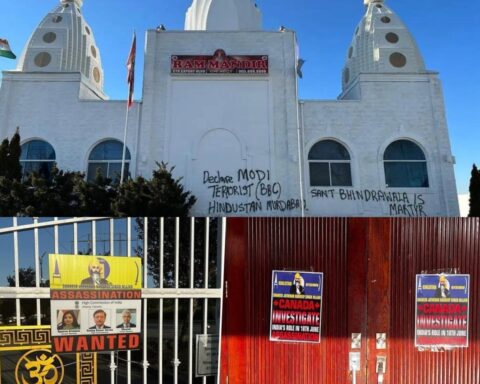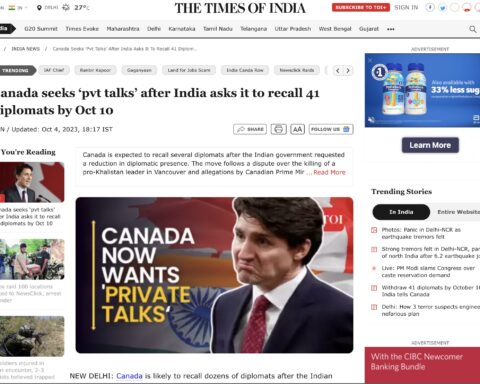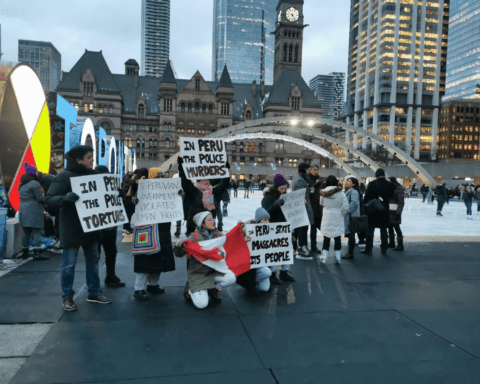When the world’s largest democracy is in the midst of choosing its next government, it is only natural that the the world’s largest cluster of Indians outside India are on tenterhooks.
Canadians of Indian origin tend to follow the tumultuous political goings-on in their country of origin. The fact that most of them don’t have the right to vote in Indian elections is hardly something that distracts them from voicing their opinion on how and who should run the country.
For the last month and more, the drawn-out Indian elections have become a hot topic for discussion. Whether it is at house parties or on open-line South Asian talk shows, at parks or even at work, Indian politics seem to have captured the imagination of not only the Indian diaspora, but South Asians in general.
The most interesting comments and debates are, of course, on open-line talk shows where “we, the emotional people,” have so much to say that hosts have a hard time switching from one caller to the other.
Interestingly, the participation by women in these talk shows is poor, although in India, women voters are being hailed as a major deciding factor in the polls this year. The Indian Election Commission had made great efforts to woo women voters through it’s ‘Power of 49 campaign (women make 49 per cent of registered voters in India), but not here in British Columbia, where political conversation in the public sphere remains a largely male bastion.
The contenders
The comments come in fast and furious: Narendra Modi (the opposition Bharatiya Janata Party, BJP’s prime ministerial candidate) is communal, Congress (the ruling party) is corrupt and the Aam Aadmi Party (AAP, a new party, translated loosely as the Party of the Ordinary Man) is like a breath of fresh air, but perhaps doesn’t have the experience … they go on and on breathlessly.
So much so that a protest rally was recently organized in Surrey’s Holland park to condemn yoga guru Baba Ramdev, who reportedly made insulting remarks about dalit (a class of people considered lower-caste) women, in India. A motley group of people at the park raised slogans against the yoga guru and called for the authorities in India to immediately arrest him.
Kuldip Grewal is a self-employed person of Indian origin who follows the elections quite closely. He listens to radio talk shows and has often engaged in discussions with friends, mainly because he feels an emotional connection to his country of origin. “We might not really know the ground realities as they exist in India, but sitting so far away we wish the best for our country. All we have heard in the last five to seven years are reports of scams and corruption and it saddens us. And, therefore, when a new party such as the Aam Aadmi Party comes forward promising to clean the system I see it as a welcome change. Whether they win or not is a million dollar question, but we want the best for India,” said Grewal.
Passionate for change
Equally passionate to see a change in India’s leadership is Vishwanath Dhiri, an accountant in Surrey. But he sees the BJP’s prime ministerial candidate Narendra Modi as the only leader who is capable of leading this change.
“AAP’s objectives might be laudable, but they have no experience in governance and it’s too early for them to actually govern a diverse country like India,” said Dhiri.
Talking about Modi’s oft-alleged communal bent of mind, he said that it is merely a mistaken perception and blamed it largely on social and other media which, he said, is often prejudiced and biased. “If you repeat a lie constantly it tends to become the truth in people’s mind. The Godhra (the 2002 riots in Gujarat in which a large number of Muslims died under Modi’s watch) riots should have never happened, but then after 2002, Gujarat has progressed by leaps and bounds. You can’t judge a person by just one incident; the benefit of the doubt has to be given to him,” he said. According to Dhiri, the Congress party, fearing a massive defeat, is desperate and therefore is fear-mongering. “I think Modi has proved himself in Gujarat. He has proved that he is business friendly and will take India forward undoubtedly,” said Dhiri.
“I think Modi has proved himself in Gujarat. He has proved that he is business friendly and will undoubtedly take India forward.”
Two extremes
Professor of political science at the University of British Columbia (UBC), Anjali Thomas Bohlken, who takes a particular interest in India, agrees that the 2014 Lok Sabha (lower house in Parliament) elections in India have become particularly interesting because of the choices that are being presented before the people. “On the one hand you have the BJP which is seeing an unprecedented surge, and on the other hand is the beleaguered Congress Party desperately trying to shed its image of being a corrupt, dynastic party. In between these two extremes is the newly minted Aam Aadmi Party, which is proving to be a massive vote spoiler,” she said.
According to her, these elections have become overly polarized because of the campaign tactics being used, especially playing the communal card. “It has been seen that both BJP and Congress have played the card to their advantage many a times previously. In these elections, emotions are being flared and both the parties are trying to either use the secularism card or the dynastic rule card,” she said.
This is something that Dr. Jasbir Singh Romana, a popular talk show host, hears regularly. He has been featuring the elections, with a particular focus on the state of Punjab (from where most Indo-Canadians in B.C. hail), for the last month and has invited journalists, opinion leaders, candidates and ordinary people from Punjab and other cities in India to speak on his show.
According to him, the anti-incumbency factor is huge. “People certainly want a change and they are pinning their hopes on the AAP, perhaps sometimes without realizing that AAP has a limited presence and can’t form the government. But for them a change is crucial at this time,” said Romana.
Interestingly, so excited are people to bring about change that, according to Romana, a large number of people have actually travelled to India, sent monetary assistance and are frantically making calls to their family members, to influence the vote. “We are all emotionally connected to our country (of origin). What happens there effects us,” he said.
“We are all emotionally connected to our country (of origin). What happens there effects us.”
Similarly, Harjinder Thind, another popular talk show host on Red 93.1 FM, also said that immigrants cannot break their ties with India so easily. “Whether it is through property, parents or family, they will always be connected and discussing what happens there, thrashing out solutions, even though they know that these might not bring about direct change, (but) gives them satisfaction that they have contributed in some way,” he said.
He said these elections are particularly very polarized because the BJP and its leader, Narendra Modi, are viewed with suspicion by the large Sikh community here. “They are worried that if he becomes the prime minister, minorities will be persecuted in India and this perception is mainly through what they see and hear in the media,” said Thind. The people here, having experienced the Congress, are worried about the BJP and now are pinning their hopes on the Aam Aadmi Party, which according to them, will change the way politics is played out in India.
And thus it will go on — discussions, comments, heated debates — until the results come in on May 16.




